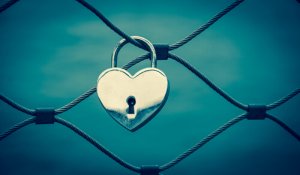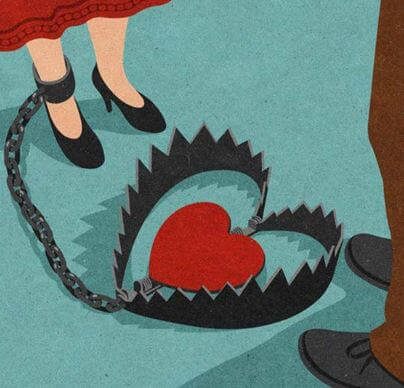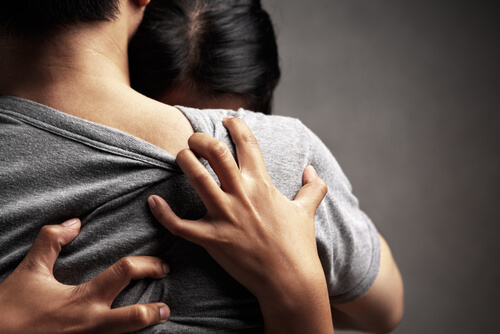Why do We Delve into Emotional Dependence?


Written and verified by the psychologist Gema Sánchez Cuevas
Every single one of us, regardless of whether we’re a man or a woman, young or old, can find ourselves in a relationship based on emotional dependence. Sometimes, we think that this type of thing can’t happen to us. But it’s worth remembering, the people in these releationships also thought they would never fall into that kind of bitter well either.
Thus, before letting our statements become so radical, let’s ask ourselves something. What leads us into a relationship based on dependence? What do we feel in this type of relationship? How can we notice whether our relationship is based on dependence or not?
On one hand, if we’re aware of what a dominant-dependent relationship is, we can see more easily if we’re in one. Whether we have become part of a dysfunctional bond. This can give us additional strength to change the situation. We can also detect when others are in this type of predicament as well. Also, we can then try to warn them.
What leads us into a relationship based on dependence?
We all have expectations about ourselves and about our partner that we would like to meet. These ideas are influenced by social and cultural beliefs. In our case, we have been taught that in order to be happy, we need to have a romantic partner. Also, we need to prioritize this partner above everything else (Castelló, 2006).
We constantly seek out romantic relationships to complete us, so they may fill our voids. We seek externally instead of looking within. This makes it so that we are simply not enough by ourselves. We nourish our fears and look to others to cover these up.
“If we don’t feel like our own beings suffice, then we create dependence with others. And if we depend on others, we are not free ourselves.”
-Villegas-

On the other hand, the way we establish bonds of affection is highly conditioned by the way we experienced attachment behaviors during childhood (Guix, 2011). For example, if we were protected excessively, we’ll feel insecure and seek people who will protect us. On the contrary, if we developed few affective bonds or none at all, we’ll desperately seek someone to give us the affection we need.
Monkey see, monkey do…
The type of relationship we see in our parents will also influence our romantic relationships. For example, if during our childhood we saw a relationship based on dominance and dependence, in which love and abuse seem to come hand-in-hand, we could establish the same type of relationship as adults. Especially since we know first-hand the mechanisms which maintain it.
Either way, the ideal thing would be for us to not search for our other half to complete us. Because this simply doesn’t exist. The truth is that each one of us is complete and whole. We are responsible for our own happiness. Furthermore, we should create our own criteria when it comes to choosing how we want to interact with our partner. We shouldn’t let ourselves be influenced too much by any other pattern. Its important to be clear on what we want and don’t want in a relationship.
What do we feel in this kind of relationship?
We cannot be ourselves within a relationship based on dependence. We feel limited and annulled, always keen on appeasing and not upsetting our partners. Anxiety, distrust, guilt, and fear are all common emotions. These are “symptoms” that can be the product of low self-esteem. The individual can feel as though they are worthless or inferior to their partner. They need the other person excessively and feel afraid or intolerant towards solitude.
“If we are not ourselves, if we can only be within the other person, if we are a reflection, our self-esteem depends on whether the light is on or off. Like the moon; when it isn’t being lit up by the light from the sun, it’s as if it didn’t exist.”
-Villegas-

Furthermore, when we’re in a toxic relationship, we tend to put up with more than we should. We put up with unpleasant comments of devaluation, incriminating glances and silent treatment, reproaches, invasion of intimacy, constant questions meant to control, lies… We put up with verbal and sometimes physical aggression. At times, the idealization of one’s partner leads to excuses for their behavior. This can include fatigue, nerves, they are doing the best they can, etc. Often, we think that the person is going to change. Other times, it is what we see outside which makes us stay.
How do we know whether our relationship is based on dependence or not?
It’s not easy to see that the relationship you’re in is one based on emotional dependence, but there are always indicators and signs which reflect this dysfunction. For example, our emotions are a clear giveaway. Our own emotions can show us that the relationship is not working well. In a healthy relationship, we shouldn’t be afraid or experience suffering.
“Emotions expose problems so that logic may solve them.”
-Greenberg-
When we find ourselves in a relationship, we can lose our perspective and solely see the things we like about our partner. In fact, we become blind to the things we are not willing to see. Often we finally wake up when we’ve been on the wrong path for a long time (Grad, 2015). Thus, it’s important to listen and take into consideration the sincere advice of the people who know us well. Yet, don’t obey their suggestions blindly and systematically either. As much as we may dislike to hear others say “they are not good for you, you need to leave.” As much as we may think they simply don’t understand… They may be right.

Love is a free choice after all…
But why do we endure a relationship that makes us suffer? Especially when it is supposed to be a free choice that we made because we considered that our partner is an important source of trust and support and someone we considered unconditional. If this is not the case, it may be necessary to break this dynamic or reconsider the situation.
The truth is that we can have a healthy relationship, without dependence or suffering, based on trust and respect. For this, it’s important to keep in mind that part of the responsibility is our own. We are not responsible for what the other person does, but we are responsible for what we do. If we change (take action or ask for help), the situation will also change.
This text is provided for informational purposes only and does not replace consultation with a professional. If in doubt, consult your specialist.








